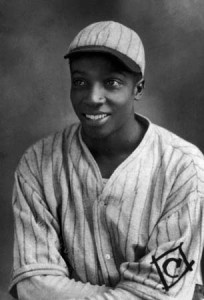I find it wonderfully ironic that I share the name of the man who many say was the fastest to ever play baseball.
Ironic, because speed afoot was never my gift, as it was for James “Cool Papa” Bell.
Another legend from the old Negro Leagues, Satchel Paige, was once asked just how fast Cool Papa was. Satch replied, “He can turn the light out and be in bed before the room gets dark.”
Paige also asserted that Bell once hit a line drive off him, and the ball whistled past Paige’s head and hit Bell in the buttocks as he slid into second base.
Now that’s fast.
Bell was elected to the Baseball Hall of Fame in 1974.
So what does raw speed have to do with writing? Just this. When you write your first drafts, write as fast as you comfortably can. Even force yourself past the comfort zone on occasion. Whether you’re an outliner, a seat-of-the-pantser, or anything in between, when you’re getting those first pages down, burn rubber.
Why? Because there is so much good stuff in your writer’s brain that needs to climb out of the basement and sniff the fresh air. You have to put your head down and butt the inner editor who stands at the basement door, telling you to be careful, slow down, don’t make a fool of yourself.
It’s also a way to just plain old get started when the “mountain” of the full novel looms ahead.
Write fast.
Since next month is NaNoWriMo, writing fast is on the agenda. And lest someone sniff about how that only produces junk, consider:
— William Faulkner wrote As I Lay Dying in six weeks, writing from midnight to 4 a.m., then sending it off to the publisher without changing a word.
— Ernest Hemingway wrote what some consider his best novel, The Sun Also Rises, also in six weeks, part of it in Madrid, and the last of it in Paris, in 1925.
— John D. MacDonald is now hailed as one of the best writers of the 1950’s. Within one stunning stretch (1953-1954) he brought out seven novels, at least two of them – The Neon Jungle and Cancel All Our Vows –masterpieces. The others were merely splendid. Over the course of the decade he wrote many more superb novels, including the classic The End of the Night, which some mention in the same breath as Truman Capote’s In Cold Blood.
So prolific was MacDonald that he was needled by a fellow writer who, over martinis, sniffed that John should slow down, ignore “paperback drivel,” and get to “a real novel.” John sniffed back that in 30 days he could write a novel that would be published in hardback, serialized in the magazines, selected by a book club and turned into a movie. The other writer laughed and bet him $50 that he couldn’t.
John went home and, in a month, wrote The Executioners. It was published in hardback by Simon & Schuster, serialized in a magazine, selected by a book club, and turned into the movie Cape Fear. Twice.
–Ray Bradbury famously wrote his classic Fahrenheit 451 in nine days, on a rented typewriter. “I had a newborn child at home,” he recalls, “and the house was loud with her cries of exaltation at being alive. I had no money for an office, and while wandering around UCLA I heard typing from the basement of Powell Library. I went to investigate and found a room with 12 typewriters that could be rented for 10 cents a half hour. So, exhilarated, I got a bag of dimes and settled into the room, and in nine days I spent $9.80 and wrote my story; in other words, it was a dime novel.”
–Jack London was anything but promising as a young writer. He could hardly string sentences together in a rudimentary fashion. About all he had was desire. A burning desire. So he shut himself up in a room and wrote. Daily. Sometimes 18 hours a day. He sent stories off that got returned. He filled up a trunk with rejections. But all the time he was learning, learning. When he died at the age of 40 he was one of the most prolific and successful writers of all time.
It is in re-writing and editing that you slow down, cool off and shape what you’ve written. First drafts invariably need a lot of work. In re-write you deepen the prose and establish your style, sharpen your scenes and flesh out your characters. You can take your time here (with deadlines in mind, of course).
My own approach is to do my day’s quota fast then spend time the next morning editing the pages before moving on. And once I do those edits, that’s it till the end of the draft. As Satchel Paige said, “Don’t look back, something may be gaining on you.”
So when you first commit words to page, write fast. It helps you discover hidden “story stuff.” This is especially important for newer writers. You learn most about writing a full length novel by actually writing a full length novel, and the sooner the better.
Write your first drafts like James “Cool Papa” Bell stealing second, then edit them like Satchel Paige, who took things slow and easy.
So how do you approach your first drafts? Do you like to type fast? Or do you agonize over sentences and paragraphs before moving on? Is Cool Papa writing something you’d like to try?

